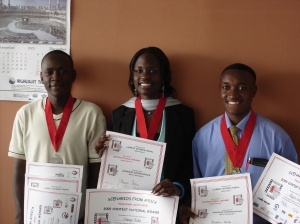
The sixth edition of the international contest dubbed Scenarios from Africa is now open. Scenarios From Africa has been a tool that has given young people a creative voice in the fight against spread of HIV and stigma. Kenyan youths have participated since 2005 through mobilization by individuals and organizations and the doors are once again open for them.
Open to all young people who will be under the age of 25 on April 1 2011, when the contest comes to a close, the Scenarios films have since inception not only, provided meaningful involvement of youth in the fight against HIV in a dignified and non-patronizing way, but they have also been an avenue to tap into the creative sensibilities of the youth on this topic.
“You are invited to come up with an original idea (a “scenario”) for a short film up to 10 minutes in length,” Oby Obyerodhyambo, the National Coordinator in Kenya, pointed out to Kymsnsetfeastures. “The best ideas will be adapted by professionals and turned into films by some of Africa’s greatest directors. It’s up to you to decide what form your idea will take. It can be a short story, a theatre piece, a comic strip, a song, a poem.”
The scenarios will be examined by juries made up of specialists in the areas of AIDS and of film. The final international jury will meet in September 2011. There will be 25 winners of the international contest. Each of these winners or winning teams will receive a cash prize of 100 Euros (or US $125, whichever is greater when the prizes are awarded), as well as the possibility to have a film based on their idea made and shown on TV and the Web. In addition, the top 3 winners or winning teams will receive special cash prizes of 1st place scenario: 2,000 Euros (or US $2,500), 2nd place scenario 1,000 Euros (or US $1,250) and 3rd place scenario 500 Euros (or US $625)
“You can write on any subject you wish, as long as it is related to HIV/AIDS,” Obyerodhyambo pointed out. “Or, if anyone would like it, they can choose one of the topics in the accompanying questionnaire to the entry. If you choose to do this, please write the topic number in the space provided at the top of the questionnaire. However, you don’t have to choose one of these suggested topics. If your scenario is on a subject that is not on this list of suggested topics, please write the number “8” at the top of the questionnaire that needs to be filled and is available from me.”
He added: “Please remember to write not only about the things that happen in your story, but also about your characters’ feelings and thoughts. In addition, we are especially interested in stories in which characters find solutions to the obstacles and challenges they face.”
In Kenya, it is 27-years since 1985 when the first case of HIV was confirmed in the country and while a lot of water has flown under the bridge, there is still a great deal that needs to be done and all this is fodder for the creative minds in the Scenarios contest.
Children born with the virus around that time, and who survived death are now either parents or could be desirous of being parents. Orphans, whose parents were snatched by HIV in the first decade of HIV in Kenya, are now establishing families after having survived in child-headed households or through the magnanimity of guardians and foster parents. In the last few years access to ART has enabled many HIV positive persons to live full lives thus changing the face of the pandemic.
A lot of positive strides have been made, but other challenges have emerged. In the response to HIV in Kenya there have been instances of corruption and outright theft that have crippled the fight as well as state confusion leading to our country being denied Global funds to fight HIV, Malaria and TB.
Stigma against PLWHIV has reduced significantly but has not entirely been wiped out. There are still cases of persons being discriminated on the basis of being HIV positive, or being thought to be so. Cases of child molestations and deliberate infections still abound just as well as cases of gender and sexual based violence. There is a steady light at the end of the tunnel, but we are as yet not out of the woods and this is what the youth are being asked to deliberate creatively using film.
Obyerodhyambo noted: “Today the challenges are around greater access to treatment by expanding testing services so that everybody knows their HIV status and gets early medical attention, supporting adherence to medication, dealing with issues surrounding choices like getting children by HIV positive persons, abuse of alcohol and drugs by PLWHIV, the increase in sexual and gender based violence and others. In other words, the challenges are still a lot. However, that we have done so well points to the fact that we can overcome.”
“Those older than 25-years can also act as coaches/mentors of youth as they grapple with the creative response to HIV,” he added. “You can provide inspiration based on personal testimony of dealing with HIV infection, or of caring for a friend or relative. As a parent you can encourage your teen child to participate and by so doing open up the unique opportunity to discuss sex and sexuality with him/her as well as human rights issues. It is a chance to have an open dialogue on the issues of Lesbian, Gay, Bisexual and Transgender (LGBT) rights. In all these efforts we can all contribute towards getting our youth to actively engage with the biggest challenge of their lifetime.”

i’d like to be part of the competition for the next year since I support those who are infected and affected by HIV.
That would be possible. Look out for information on these pages. Thanks.